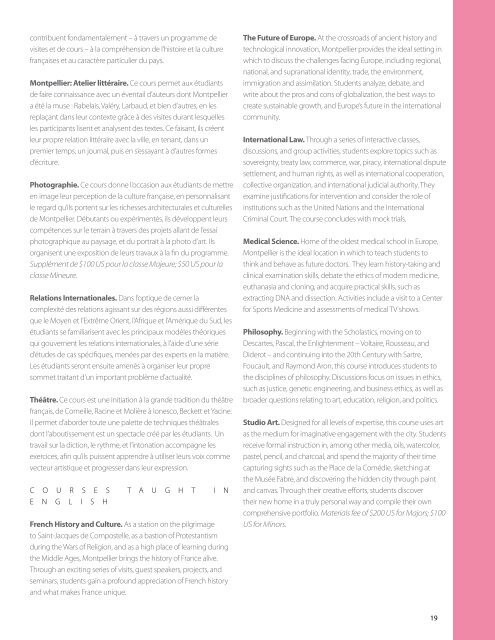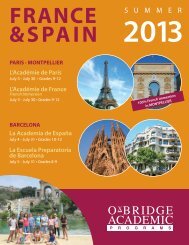You also want an ePaper? Increase the reach of your titles
YUMPU automatically turns print PDFs into web optimized ePapers that Google loves.
contribuent fondamentalement – à travers un programme de<br />
visites et de cours – à la compréhension de l’histoire et la culture<br />
françaises et au caractère particulier du pays.<br />
Montpellier: atelier littéraire. Ce cours permet aux étudiants<br />
de faire connaissance avec un éventail d’auteurs dont Montpellier<br />
a été la muse : Rabelais, Valéry, Larbaud, et bien d’autres, en les<br />
replaçant dans leur contexte grâce à des visites durant lesquelles<br />
les participants lisent et analysent des textes. Ce faisant, ils créent<br />
leur propre relation littéraire avec la ville, en tenant, dans un<br />
premier temps, un journal, puis en s’essayant à d’autres formes<br />
d’écriture.<br />
photographie. Ce cours donne l’occasion aux étudiants de mettre<br />
en image leur perception de la culture française, en personnalisant<br />
le regard qu’ils portent sur les richesses architecturales et culturelles<br />
de Montpellier. Débutants ou expérimentés, ils développent leurs<br />
compétences sur le terrain à travers des projets allant de l’essai<br />
photographique au paysage, et du portrait à la photo d’art. Ils<br />
organisent une exposition de leurs travaux à la fin du programme.<br />
Supplément de $100 US pour la classe Majeure; $50 US pour la<br />
classe Mineure.<br />
relations internationales. Dans l’optique de cerner la<br />
complexité des relations agissant sur des régions aussi différentes<br />
que le Moyen et l’Extrême Orient, l’Afrique et l’Amérique du Sud, les<br />
étudiants se familiarisent avec les principaux modèles théoriques<br />
qui gouvernent les relations internationales, à l’aide d’une série<br />
d’études de cas spécifiques, menées par des experts en la matière.<br />
Les étudiants seront ensuite amenés à organiser leur propre<br />
sommet traitant d’un important problème d’actualité.<br />
Théâtre. Ce cours est une initiation à la grande tradition du théâtre<br />
français, de Corneille, Racine et Molière à Ionesco, Beckett et Yacine.<br />
Il permet d’aborder toute une palette de techniques théâtrales<br />
dont l’aboutissement est un spectacle créé par les étudiants. un<br />
travail sur la diction, le rythme, et l’intonation accompagne les<br />
exercices, afin qu’ils puissent apprendre à utiliser leurs voix comme<br />
vecteur artistique et progresser dans leur expression.<br />
C O u R S E S T A u G H T I n<br />
E n G L I S H<br />
French History and culture. As a station on the pilgrimage<br />
to Saint-Jacques de Compostelle, as a bastion of Protestantism<br />
during the Wars of Religion, and as a high place of learning during<br />
the Middle Ages, Montpellier brings the history of France alive.<br />
Through an exciting series of visits, guest speakers, projects, and<br />
seminars, students gain a profound appreciation of French history<br />
and what makes France unique.<br />
The Future of europe. At the crossroads of ancient history and<br />
technological innovation, Montpellier provides the ideal setting in<br />
which to discuss the challenges facing Europe, including regional,<br />
national, and supranational identity, trade, the environment,<br />
immigration and assimilation. Students analyze, debate, and<br />
write about the pros and cons of globalization, the best ways to<br />
create sustainable growth, and Europe’s future in the international<br />
community.<br />
international Law. Through a series of interactive classes,<br />
discussions, and group activities, students explore topics such as<br />
sovereignty, treaty law, commerce, war, piracy, international dispute<br />
settlement, and human rights, as well as international cooperation,<br />
collective organization, and international judicial authority. They<br />
examine justifications for intervention and consider the role of<br />
institutions such as the united nations and the International<br />
Criminal Court. The course concludes with mock trials.<br />
Medical Science. Home of the oldest medical school in Europe,<br />
Montpellier is the ideal location in which to teach students to<br />
think and behave as future doctors. They learn history-taking and<br />
clinical examination skills, debate the ethics of modern medicine,<br />
euthanasia and cloning, and acquire practical skills, such as<br />
extracting DnA and dissection. Activities include a visit to a Center<br />
for Sports Medicine and assessments of medical TV shows.<br />
philosophy. Beginning with the Scholastics, moving on to<br />
Descartes, Pascal, the Enlightenment – Voltaire, Rousseau, and<br />
Diderot – and continuing into the 20th Century with Sartre,<br />
Foucault, and Raymond Aron, this course introduces students to<br />
the disciplines of philosophy. Discussions focus on issues in ethics,<br />
such as justice, genetic engineering, and business ethics, as well as<br />
broader questions relating to art, education, religion, and politics.<br />
Studio art. Designed for all levels of expertise, this course uses art<br />
as the medium for imaginative engagement with the city. Students<br />
receive formal instruction in, among other media, oils, watercolor,<br />
pastel, pencil, and charcoal, and spend the majority of their time<br />
capturing sights such as the Place de la Comédie, sketching at<br />
the Musée Fabre, and discovering the hidden city through paint<br />
and canvas. Through their creative efforts, students discover<br />
their new home in a truly personal way and compile their own<br />
comprehensive portfolio. Materials fee of $200 US for Majors; $100<br />
US for Minors.<br />
19



